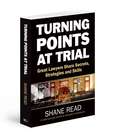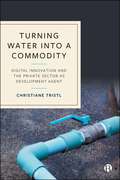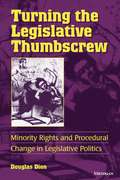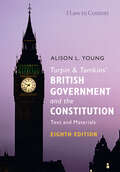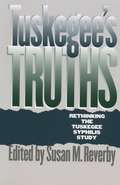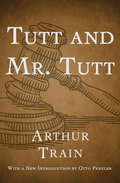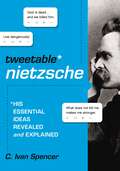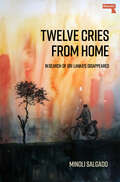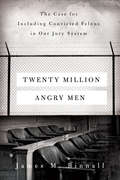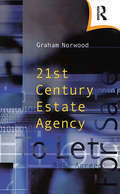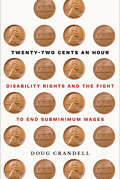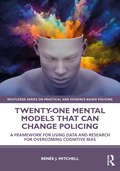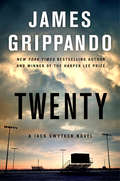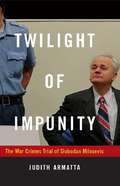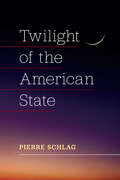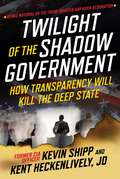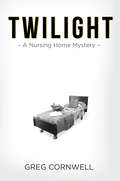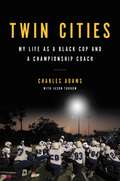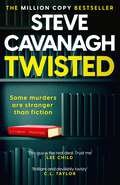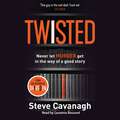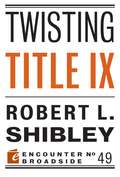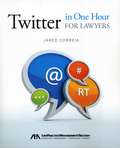- Table View
- List View
Turning Points At Trial: Great Lawyers Share Secrets, Strategies And Skill
by Shane ReadThirteen of the greatest lawyers in the country, such as Robert S. Bennett, Alan Dershowitz, Mark Lanier, Bryan Stevenson, and Tom Girardi share with you the powerful secrets from their most interesting cases, from depositions to trials to appeals. Lawyers can apply these techniques immediately in their practice. Non lawyers will get a front row seat to these fascinating lawyers and the turning points in their most intriguing cases. There are also 447 tips summarized in chapter checklists. Leaders of the best litigation organizations and judges have called Turning Points the best trial advocacy book. In addition, the book's website has related audio and video clips that enhance the lessons that are taught. Today's most successful lawyers benefit from the wisdom described in this book and now you can too.The book is divided into seven parts: opening statement, direct examination, cross-examination, cross-examination of the expert witness, closing argument, deposition, and appellate oral argument. In each part, there are chapters that profile an attorney famous for his or her skills and an analysis of court transcripts where that skill was displayed. For example, chapter one features Mark Lanier, who has achieved nationally recognized record-setting jury awards. Lanier candidly reveals his strategies and secrets for creating a spellbinding opening statement. The author, an accomplished trial attorney and highly acclaimed teacher, then extensively analyzes a court transcript from one of Lanier's famous trials so you can learn the building blocks for an opening statement and apply Lanier's techniques at your next trial. At the end of the chapter, there is a checklist that summarizes Lanier's tips.Other chapters feature highly acclaimed lawyers such as Alan Dershowitz who explains the key to a successful cross-examination and Lisa Blatt, the woman with the most appearances before the U.S. Supreme Court, who shares her secrets for a successful oral argument. In short, this book will teach you everything you need to know from deposition to trial to appellate oral advocacy from
Turning Water into a Commodity: Digital Innovation and the Private Sector as Development Agent
by Christiane TristlPay-as-you-go water dispensers are used in many areas in the Global South, particularly those that are ‘off-grid’. This book examines the increasing influence of private corporations and philanthrocapitalist principles in development cooperation in the SDG-era by focusing on water supply to the inhabitants of rural and peri-urban areas of Kenya. The book explores how private sector approaches and digital technologies open up remote regions to permanent arrangements of transnational market-based water supply beyond state sovereignty, which define their users as paying customers. Considering these technological solutions alongside socio-political realities and local knowledge, it offers a nuanced perspective on the promises and limitations of market-based interventions in the water sector.
Turning the Legislative Thumbscrew
by Douglas DionThe use of filibusters in the U. S. Senate by small numbers of members to prevent legislative action apparently desired by a majority of the members--as evidenced by the battles over civil rights legislation in the 1950s and 1960s--is legendary. Similar situations have existed in other legislative bodies over time. The fear that they will at some time be in the minority has inhibited actions by the majority groups to control the right of minority groups to block legislative action. And yet from time to time the majority in a legislative body has forced a change in the rules to control the rights of the minority. When does the majority seek to limit minority rights to obstruct legislation? Douglas Dion, in a unique study, develops a formal model to set out the conditions under which majorities will limit minority rights. He finds that when majorities are small, they will be more cohesive. This majority cohesion leads to minority obstruction, which in turn leads to majority efforts to force procedural change to control the ability of the minority to obstruct legislation. Dion then tests his findings in a rich consideration of historical cases from the nineteenth-century U. S. House of Representatives, the nineteenth- and twentieth-century U. S. Senate, the British House of Commons, and an account of the Austro-Hungarian Parliament written by Mark Twain. Turning the Legislative Thumbscrewis a work that combines formal analysis with extensive historical evidence to address an important problem in democratic theory. Specialists in legislative politics and American political development, as well as those more broadly interested in the relationship between democratic theory and institutional structure, will find the work of great interest. Douglas Dion is Assistant Professor of Political Science, University of Michigan.
Turpin and Tomkins' British Government and the Constitution: Text and Materials (Law in Context)
by Alison L. YoungA lot has happened to the UK Constitution in the last seven years. We've witnessed the UK's exit from the EU, further devolution to Scotland and Wales, a number of prominent cases by the Supreme Court, two early parliamentary general elections, major governmental defeats and two Prime Ministerial resignations. Alison Young has built on the text of Colin Turpin and Adam Tomkins' earlier edition, keeping their unique historical and contextual approach, whilst bringing the material up to date with more contemporary examples, including references to Brexit, the recent prorogation and Brexit case law, and the Covid-19 pandemic. The book continues to include substantial extracts from parliamentary and other political sources as well as from legislation and case law. It also provides a full yet accessible account of the British constitution at the culmination of a series of dramatic events, on the threshold of possible further constitutional reform.
Tuskegee's Truths: Rethinking the Tuskegee Syphilis Study
by Susan M. ReverbyBetween 1932 and 1972, approximately six hundred African American men in Alabama served as unwitting guinea pigs in what is now considered one of the worst examples of arrogance, racism, and duplicity in American medical research--the Tuskegee syphilis study. Told they were being treated for "bad blood," the nearly four hundred men with late-stage syphilis and two hundred disease-free men who served as controls were kept away from appropriate treatment and plied instead with placebos, nursing visits, and the promise of decent burials. Despite the publication of more than a dozen reports in respected medical and public health journals, the study continued for forty years, until extensive media coverage finally brought the experiment to wider public knowledge and forced its end.This edited volume gathers articles, contemporary newspaper accounts, selections from reports and letters, reconsiderations of the study by many of its principal actors, and works of fiction, drama, and poetry to tell the Tuskegee story as never before. Together, these pieces illuminate the ethical issues at play from a remarkable breadth of perspectives and offer an unparalleled look at how the study has been understood over time.
Tutt and Mr. Tutt
by Otto Penzler Arthur TrainAmerica's wisest and kindliest lawyer tackles a series of impossible cases--and wins Ephraim Tutt, Esq., never met a hard luck story he didn't like. The rare lawyer happy to forego his fee, Tutt specializes in defending the downtrodden against the powerful and the corrupt. In Manhattan and his hometown of Pottsville, New York, he argues cases involving murder, forgery, and theft, always finding some arcane legal point to save the day--much to the chagrin of the prosecution. In this delightful collection, Tutt brings his sharp mind and genial wit to bear on the cases of the "Mock Hen and Mock Turtle," the "Hepplewhite Tramp," the "Lallapaloosa Limited," and many others. Based on author Arthur Train's experiences working in the offices of the New York District Attorney, Tutt and Mr. Tutt is a must-read for fans of legal mysteries. This ebook features a new introduction by Otto Penzler and has been professionally proofread to ensure accuracy and readability on all devices.
Tweetable Nietzsche: His Essential Ideas Revealed and Explained
by C. Ivan SpencerFriedrich Nietzsche radically confronted Western culture, morality, and social mores, until his death in 1900. Occupying a first-rank position as a thinker, his thought later inspired numerous movements that weave the tapestries of contemporary culture: existentialism, theology, nihilistic culture, Nazism, twentieth century film and art, atheism, ethical egoism, deconstruction, the hermeneutics of suspicion, and the postmodern age. Nietzsche’s incalculable sway on our culture persists to this day. Even his acerbic criticism of Christianity has affected the religion. But many people remain unaware of the pervasive attitudes Nietzsche disseminated, attitudes they echo. His stark prophecy that “God is dead, and we killed him” thrives in this accelerating secular age where postmodernists lionized him as a prophetic voice of a new era. Tweetable Nietzsche introduces and analyzes the worldview of Friedrich Nietzsche. Nietzsche’s tweets, 140 characters or less, provide readers a distilled essence of every major aspect of his worldview. Each tweet illustrates some aspect of his worldview contributing toward a full-orbed understanding of Nietzsche’s thought.
Twelve Cries from Home: In Search of Sri Lanka's Disappeared
by Minoli SalgadoTwelve Cries from Home speaks out against Sri Lanka&’s official silencing of war crimes, reclaiming the stories of survivors who insist on being heard.Since August 2020, the intimidation of witnesses and journalists has surged in Sri Lanka. Twelve Cries from Home navigates the memories and stories of twelve war survivors, mostly women and relatives of the disappeared, who wished to have their stories retold so that a permanent record might be made, and so that those outside the country might understand their experiences. The outcome of a journey across the island in late 2018 by writer and Professor of Literature Minoli Salgado, who was revisiting her ancestral home, Twelve Cries from Home is deeply-layered and localised work of travelling witness. It returns to the concept of home as a place of belonging and security, which is a lost ideal for most, and uses a Sri Lankan measure of distance – the call, or hoowa – to ask how we might attend to stories that are difficult to tell and to hear.Exploring the bitter complexity of war by presenting stories from four regions of Sri Lanka, it reveals the complex network of relationships between the agents of conflict and their victims, as well as the blurred boundary between victims and perpetrators, the role of informers and the process of ethical repair after traumatic experience. Twelve Cries from Home offers a rare glimpse into a country subject to enforced self-censorship, allowing us to take stock of social and political developments in Sri Lanka and what has and has not been achieved in light of the transitional justice mechanisms promised to the UN.
Twenty Million Angry Men: The Case for Including Convicted Felons in Our Jury System
by James M. BinnallToday, all but one U.S. jurisdiction restricts a convicted felon’s eligibility for jury service. Are there valid, legal reasons for banishing millions of Americans from the jury process? How do felon-juror exclusion statutes impact convicted felons, jury systems, and jurisdictions that impose them? Twenty Million Angry Men provides the first full account of this pervasive yet invisible form of civic marginalization. Drawing on extensive research, James M. Binnall challenges the professed rationales for felon-juror exclusion and highlights the benefits of inclusion as they relate to criminal desistance at the individual and community levels. Ultimately, this forward-looking book argues that when it comes to serving as a juror, a history of involvement in the criminal justice system is an asset, not a liability.
Twenty Names in Crime (Twenty Names)
by Andrew LangleyA collection of brief biographies of twenty famous criminals. Included are William Kidd (Billy the Kid), Jonathan Wild, Anne Bonny, Dick Turpin, Burke and Hare, Kaspar Hauser, Madeleine Smith, Ned Kelly, Sophie Lyons, Lizzie Borden, Butch Cassidy, Doctor Crippen, Mata Hari, Bonnie and Clyde, Al Capone, Han van Meegeren, Salvatore Giuliano, Lee Harvey Oswald, Emil Savundra, and Phoolan Devi.
Twenty-First Century Estate Agency
by Graham NorwoodThis book is a must have for those estate agents who want to work more effectively in order to grow their business and profits. With 12,000 separately owned estate agencies in the UK this book illustrates how new technology and working practices can revolutionise the industry. Technology can help to improve the competitiveness and sometimes-tarnished image of estate agents in the eyes of the general public. The book contains case studies from international markets and shows how competitive the industry is and how each competitor needs to adopt new approaches to outwit rivals – and to reassure an increasingly sceptical public that agents are worth using, add value and earn their commission.
Twenty-Two Cents an Hour: Disability Rights and the Fight to End Subminimum Wages
by Doug CrandellIn Twenty-Two Cents an Hour, Doug Crandell uncovers the harsh reality of people with disabilities in the United States who are forced to work in unethical conditions for subminimum wages with little or no opportunity to advocate for themselves, while wealthy CEOs grow even wealthier as a direct result. As recently as 2016, the United States Congress enacted bipartisan legislation which continued to allow workers with disabilities to legally be paid far lower than the federal minimum wage. Drawing on ongoing federal Department of Justice lawsuits, the horrifying story of Henry's Turkey Farm in Iowa, and more, Crandell shows the history of the policies that have led to these unjust outcomes, examines who benefits from this legislation, and asks important questions about the rise of a disability industrial complex. Exposing this complex—which is rooted in profit, lobbying, and playing on the emotions of workers' parents and families, as well as the public—Crandell challenges readers to reexamine how we treat some of our most vulnerable fellow citizens. Twenty-Two Cents an Hour forces the reader to face the reality of this exploitation, and builds the framework needed for reform.
Twenty-one Mental Models That Can Change Policing: A Framework for Using Data and Research for Overcoming Cognitive Bias (Routledge Series on Practical and Evidence-Based Policing)
by Renée J. MitchellThis book goes beyond other police leadership books to teach practitioners how to think about policing in a structured way that synthesizes criminological theory, statistics, research design, applied research, and what works and what doesn’t in policing into Mental Models. A Mental Model is a representation of how something works. Using a Mental Model framework to simplify complex concepts, readers will take away an in-depth understanding of how cognitive biases affect our ability to understand and interpret data, what empirical research says about effective police interventions, how statistical data should be structured for management meetings, and how to evaluate interventions for efficiency and effectiveness. While evidence-based practice is critical to advancing the police profession, it is limited in scope, and is only part of what is necessary to support sustainable change in policing. Policing requires a scientifically based framework to understand and interpret data in a way that minimizes cognitive bias to allow for better responses to complex problems. Data and research have advanced so rapidly in the last several decades that it is difficult for even the most ambitious of police leaders to keep pace. The Twenty-one Mental Models were synthesized to create a framework for any police, public, or community leader to better understand how cognitive bias contributes to misunderstanding data and gives the reader the tools to overcome those biases to better serve their communities. The book is intended for a wide range of audiences, including law enforcement and community leaders; scholars and policy experts who specialize in policing; students of criminal justice, organizations, and management; reporters and journalists; individuals who aspire to police careers; and citizen consumers of information about policing. Anyone who is going to make decisions about their communities based on data has a responsibility to be numerate and this book Twenty-one Mental Models That Can Change Policing: A Framework For Using Data and Research For Overcoming Cognitive Bias, will help you become just that.
Twenty: A Jack Swyteck Novel (Jack Swyteck Novel #17)
by James GrippandoJack Swyteck and his family are caught in the crossfire after a deadly school shooting claims twenty casualties—Florida’s fifth mass shooting in as many years—in this provocative and timely thriller from Harper Lee Prize–winner James Grippando that touches on some of the most contentious issues roiling America today.It is the message every parent of a school-age child fears: “Active Shooter on Campus.” Jack Swyteck is at his office when he receives the emergency text from Riverside Day School. Both his daughter, Righley, and his wife, FBI agent Andie Henning, are in danger. Andie is in the school’s rec center when she hears the fire alarms, then loud popping noises and screams coming from the hallway. A trained law-enforcement officer, Andie knows she’s supposed to stay locked down inside the room. But Righley is in her kindergarten classroom and Andie must get her to safety.The tragedy prompts mass hysteria—and dangerous speculation. The police haven’t identified the shooter, but they find a handgun on the school grounds registered to a parent, a Muslim man named Amir Khoury. News of the gun and its owner leaks and quickly goes viral. Within minutes Al Qaeda claims responsibility. Andie is shocked—Amir is married to her friend, Lilly, a WASP whose bloodline goes back to the American Revolution. When Xavier, Amir and Lilly’s oldest child and an eighteen-year-old senior at Riverside confesses to the crime, the local community’s anti-Muslim fervor explodes to levels unseen since 9/11. Terrified for her son’s life, Lilly asks Jack to step in. A seasoned defense attorney with a passion to see justice done, he’s taken on plenty of complicated cases. Xavier’s, however, is not one he’s inclined to take—until an old friend who lost his daughter in the shooting tells him that he must. With the public calling for blood and prosecutors confident their case is air tight, Jack must unearth the Khourys’ family secrets in order to expose the shocking truth and save his client from certain death. But he may not be able to save everyone—including himself.
Twilight of Impunity: The War Crimes Trial of Slobodan Milosevic
by Judith ArmattaAn eyewitness account of the first major international war-crimes tribunal since the Nuremberg trials, Twilight of Impunity is a gripping guide to the prosecution of Slobodan Milosevic for war crimes, crimes against humanity, and genocide. The historic trial of the "Butcher of the Balkans" began in 2002 and ended abruptly with Milosevic's death in 2006. Judith Armatta, a lawyer who spent three years in the former Yugoslavia during Milosevic's reign, had a front-row seat at the trial. In Twilight of Impunity she brings the dramatic proceedings to life, explains complex legal issues, and assesses the trial's implications for victims of the conflicts in the Balkans during the 1990s and international justice more broadly. Armatta acknowledges the trial's flaws, particularly Milosevic's grandstanding and attacks on the institutional legitimacy of the International Criminal Tribunal. Yet she argues that the trial provided an indispensable legal and historical narrative of events in the former Yugoslavia and a valuable forum where victims could tell their stories and seek justice. It addressed crucial legal issues, such as the responsibility of commanders for crimes committed by subordinates, and helped to create a framework for conceptualizing and organizing other large-scale international criminal tribunals. The prosecution of Slobodan Milosevic in The Hague was an important step toward ending impunity for leaders who perpetrate egregious crimes against humanity.
Twilight of the American State
by Pierre SchlagThe sudden emergence of the Trump nation surprised nearly everyone, including journalists, pundits, political consultants, and academics. When Trump won in 2016, his ascendancy was widely viewed as a fluke. Yet time showed it was instead the rise of a movement—angry, militant, revanchist, and unabashedly authoritarian. How did this happen? Twilight of the American State offers a sweeping exploration of how law and legal institutions helped prepare the grounds for this rebellious movement. The controversial argument is that, viewed as a legal matter, the American state is not just a liberal democracy, as most Americans believe. Rather, the American state is composed of an uneasy and unstable combination of different versions of the state—liberal democratic, administered, neoliberal, and dissociative. Each of these versions arose through its own law and legal institutions. Each emerged at different times historically. Each was prompted by deficits in the prior versions. Each has survived displacement by succeeding versions. All remain active in the contemporary moment—creating the political-legal dysfunction America confronts today. Pierre Schlag maps out a big picture view of the tribulations of the American state. The book abjures conventional academic frameworks, sets aside prescriptions for quick fixes, dispenses with lamentations about polarization, and bypasses historical celebrations of the American Spirit.
Twilight of the Idols: Or How To Philosophize With A Hammer (Dover Thrift Editions)
by Friedrich Nietzsche"Twilight of the Idols means that the old truth is on its last legs," declared Friedrich Nietzsche in this 1889 polemic. Forceful in his language and profound in his message, the philosopher delivered the nineteenth century's most devastating attack on Christianity. Intended by Nietzsche as a general introduction to his philosophy, it assails the "idols" of Western philosophy and culture, including the concepts of Socratic rationality and Christian morality. Written while Nietzsche was at the peak of his powers, less than a year before the onset of the insanity that gripped him until his death in 1900, this work's proximity to the end of the author's career renders it a distinctive portrait from his later period. The source of the famous dictum, "Whatever does not kill me makes me stronger," it blazes with provocative, inflammatory rhetoric that challenges readers to reexamine what they worship and why.
Twilight of the Shadow Government: How Transparency Will Kill the Deep State
by Kent Heckenlively Kevin ShippIn this groundbreaking book, Kevin Shipp, a veteran CIA agent who worked with all four Directorates of the agency, including protecting the head of the CIA, provides his perspective on how the agency has strayed so far from its original mission to provide accurate intelligence to the American president. You will learn about the founding of the Agency, how the intelligence agencies have manipulated journalists through Project Mockingbird, as well as their new efforts with the Center for Global Engagement and Big Tech interference. Shipp will also give you his up close and personal assessment of how the directors of the agency have contributed to our safety or undermined it. Shipp and Heckenlively detail how the CIA has blocked whistleblowers and the reforms they champion, while also controlling our country through secret alliances with large corporations, Wall Street, Big Media, the drug trade, and blackmail of our political leaders. Shipp provides his own history with the Agency, both the good and bad, including the Agency&’s attempt to ruin his career and life when he turned whistleblower. Perhaps most striking of all, Shipp lays out his plan for a dramatic overhaul of the Agency, likely to win wide approval from other sectors of the intelligence community, restoring the freedom of our country, while also keeping us safe from our adversaries.
Twilight: A Nursing Home Mystery
by Greg CornwellA story that unashamedly promotes death with dignity, currently practiced overseas but not widely in Australia. A nursing home in a rural town. Residents are inexplicably dying earlier than expected, much to the concern of Twilight’s Board. Who is behind these mysterious deaths? And why? How will they be held to account? And when will the Australian public be given a voice in this crucial issue of end-of-life choice and empowerment.
Twin Cities: My Life as a Black Cop and a Championship Coach
by Charles AdamsA Black Minneapolis cop and inner-city football coach faces racial reckoning after the murder of George Floyd inflames his city and forces him to explore the tensions in the neighborhood where he grew up. Charles Adams is a product of the Minneapolis&’s North Side, the city&’s poorest neighborhood, and of North High, the state&’s poorest school. After graduation he joined the Minneapolis Police Department, overcoming racial prejudice within its ranks to become his alma mater&’s resource officer. North High was in rapid decline, a building designed for 1,700 students down to about 200. Once the centerpiece of the community, the school was on the verge of folding. Then something magical happened. Adams stepped in as football coach, and transformed a winless team into state champions. With that success came renewed pride in the school and neighborhood both. As North High began to thrive, Adams was hailed as a model of what a Black man from a Black neighborhood might be. That lasted until Derek Chauvin murdered George Floyd, which brought a rain of chaos upon Minneapolis. Working to maintain order in a riotous city, Adams feared for his life, his relationship to his community forever changed. The memoir of a life divided, Twin Cities is the story of what happens when a man gives everything to his city in an effort to help kids envision a better future, only to have his city turn on him in response. Adams navigates the space between reality and perception, between law and justice, with the insight and wisdom he has gained from his unique experience.
Twisted: Don't let murder get in the way of a good story
by Steve CavanaghFROM THE BESTSELLING AUTHOR OF THIRTEEN'This guy is the real deal. Trust me.' Lee Child******************BEFORE YOU READ THIS BOOKI WANT YOU TO KNOW THREE THINGS:1. The police are looking to charge me with murder.2. No one knows who I am. Or how I did it.3. If you think you've found me. I'm coming for you next.After you've read this book, you'll know: the truth is far more twisted...******************'A fantastic standalone thriller. Punchy, ridiculously gripping, fast-paced, clever. Beautifully-plotted and incredibly fun to read. He's done it again. SUPERB.' Will Dean'Brilliant and devilishly twisty and turny.' C.L. Taylor'Outstanding. Totally absorbing and compelling. Amasterpiece in thriller plotting - twists and turns at a ferocious pace, leading to a nail-biting conclusion.' Mel Sherrat'Twisted and dark, another rip roaring rollercoaster ride.' Angela Clarke'Looks set to cement his status as heir apparent to John Grisham.' Daily Express'As nastily inventive as his highly successful Thirteen.' Sunday Express'A fantastic read. Guaranteed to be one of the big books of 2019. You won't be able to put this down. It's about time we found out the truth about JT LeBeau...' Luca Veste'A corkscrewing rollercoaster of thrills, switchbacks, loop-de-loops and screaming good fun. Add it to your wish list!' Mark Edwards'Steve Cavanagh must have sold his soul to the devil at the crossroads outside of Rosedale, Mississippi in exchange for becomingone of the world's best crime writers. Just read TWISTED and he's done it again. As edgy, gripping & brilliant as Thirteen. Steve is 5/5' Adrian McKinty
Twisted: Don't let murder get in the way of a good story
by Steve CavanaghFROM THE BESTSELLING AUTHOR OF THIRTEEN'This guy is the real deal. Trust me.' Lee Child******************BEFORE YOU READ THIS BOOKI WANT YOU TO KNOW THREE THINGS:1. The police are looking to charge me with murder.2. No one knows who I am. Or how I did it.3. If you think you've found me. I'm coming for you next.After you've read this book, you'll know: the truth is far more twisted...******************'A fantastic standalone thriller. Punchy, ridiculously gripping, fast-paced, clever. Beautifully-plotted and incredibly fun to read. He's done it again. SUPERB.' Will Dean'Brilliant and devilishly twisty and turny.' C.L. Taylor'Outstanding. Totally absorbing and compelling. Amasterpiece in thriller plotting - twists and turns at a ferocious pace, leading to a nail-biting conclusion.' Mel Sherrat'Twisted and dark, another rip roaring rollercoaster ride.' Angela Clarke'Looks set to cement his status as heir apparent to John Grisham.' Daily Express'As nastily inventive as his highly successful Thirteen.' Sunday Express'A fantastic read. Guaranteed to be one of the big books of 2019. You won't be able to put this down. It's about time we found out the truth about JT LeBeau...' Luca Veste'A corkscrewing rollercoaster of thrills, switchbacks, loop-de-loops and screaming good fun. Add it to your wish list!' Mark Edwards'Steve Cavanagh must have sold his soul to the devil at the crossroads outside of Rosedale, Mississippi in exchange for becomingone of the world's best crime writers. Just read TWISTED and he's done it again. As edgy, gripping & brilliant as Thirteen. Steve is 5/5' Adrian McKinty
Twisted: The Sunday Times Bestseller
by Steve CavanaghBEFORE YOU READ THIS BOOKI WANT YOU TO KNOW THREE THINGS:1. The police are looking to charge me with murder.2. No one knows who I am. Or how I did it.3. If you think you've found me. I'm coming for you next. After you've read this book, you'll know: the truth is far more twisted...Praise for Steve Cavanagh'This guy is the real deal' Lee Child'Brilliant and twisty' Ruth Ware'Smart and original' Clare Mackintosh'A fantastic thriller writer' Mark Billingham
Twisting Title IX
by Robert L. ShibleyThis is the story of how Title IX, a 1972 law intended to ban sex discrimination in education, became a monster that both the federal government and many college administrators treat as though it supersedes both the U.S. Constitution and hundreds of years of common law. It's a story about the victims of this law-men and women both-and of the unaccountable government bureaucrats at the Departments of Education and Justice who repeatedly prioritize an extreme brand of politics over free speech, fundamental fairness, and basic human decency. But while help may come too late for many of the present victims of Title IX abuse, there are still measures that colleges and courts can take to curb these abuses until Congress acts-or we see a Presidential administration that cares more about restoring justice and the rule of law than it does about sex and gender politics.
Twitter in One Hour for Lawyers
by Jared CorreiaMore lawyers than ever before are using Twitter to network with colleagues, attract clients, market their law firms, and even read the news. But to the uninitiated, Twitter's short messages, or tweets, can seem like they are written in a foreign language. Twitter in One Hour for Lawyers will demystify one of the most important social-media platforms of our time and teach you to tweet like an expert. In just one hour, you will learn to: Create a Twitter account and set up your profile Read tweets and understand Twitter jargon Write tweets and send them at the appropriate time Gain an audience follow and be followed Engage with other Twitters users Integrate Twitter into your firm's marketing plan Cross-post your tweets with other social media platforms like Facebook and LinkedIn Understand the relevant ethics, privacy, and security concerns Get the greatest possible return on your Twitter investment And much more "
